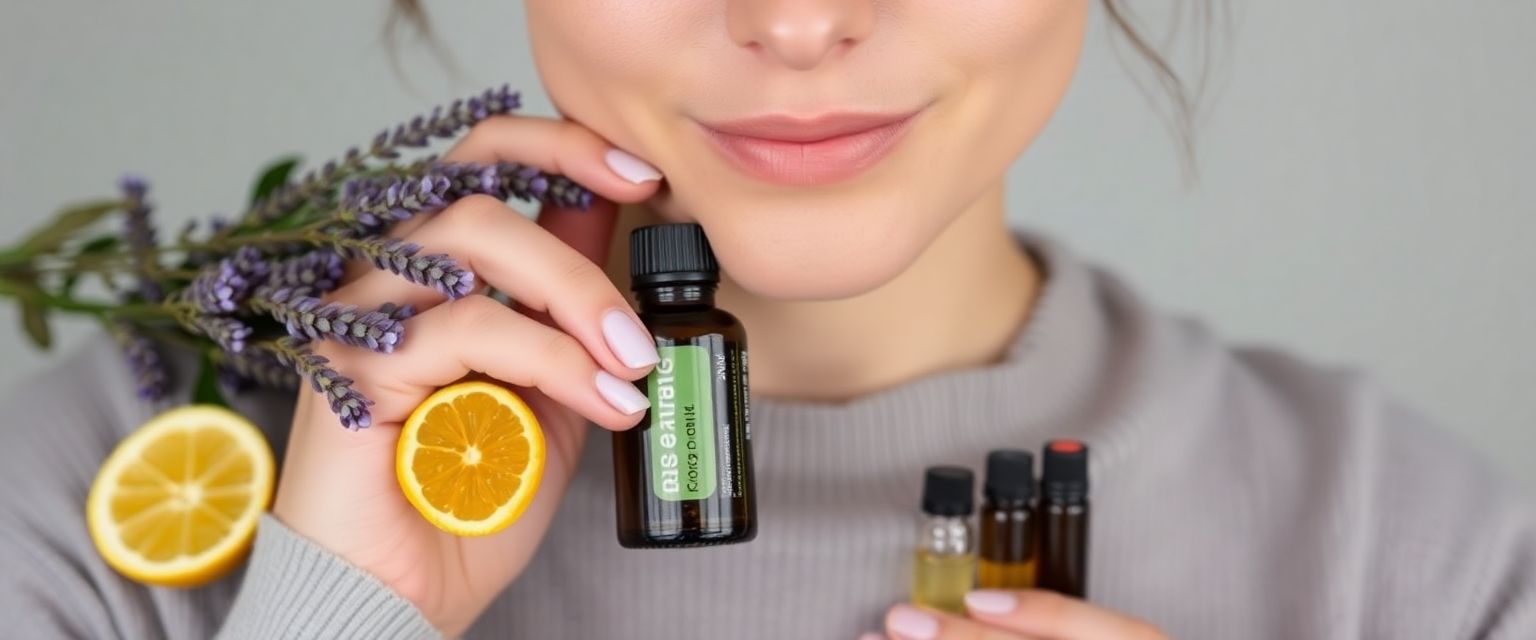The Science Behind Aromatherapy
Aromatherapy harnesses the power of scent to influence our emotions and well-being. When we inhale essential oils, their molecules travel through our olfactory system directly to the limbic system, the emotional center of our brain. This direct connection allows essential oils to have a profound impact on our mood, stress levels, and overall emotional state.
The limbic system includes structures like the amygdala, which processes emotions, and the hippocampus, involved in memory formation. By stimulating these areas, essential oils can trigger the release of neurotransmitters like serotonin and dopamine, which play crucial roles in regulating mood and emotional responses.
Research has shown that different scents can elicit specific emotional and physiological responses. For example, lavender has been found to increase alpha brain waves associated with relaxation, while citrus scents like bergamot can boost mood and reduce stress hormones like cortisol.
1. Lavender
Lavender essential oil is renowned for its versatility in promoting emotional well-being. Its calming and relaxing properties make it a go-to choice for reducing anxiety, improving sleep quality, and fostering overall emotional balance.
Recommended Product:
SIVA Lavender Essential Oil – SIVA Lavender Oil 4oz is an essential oil and is obtained by steam distillation of Lavandula Angustifolia flowers. This Lavender essential oil is free of preservatives and comes with a dropper for easy application. The fresh and floral scent of SIVA Lavender oil makes the surroundings aromatic. Add a few drops of the oil in a deodorizer for a delightful aroma. It is perfect to use Lavender essential oil for diffuser at home as it is a popular choice for aromatherapy all across the world.
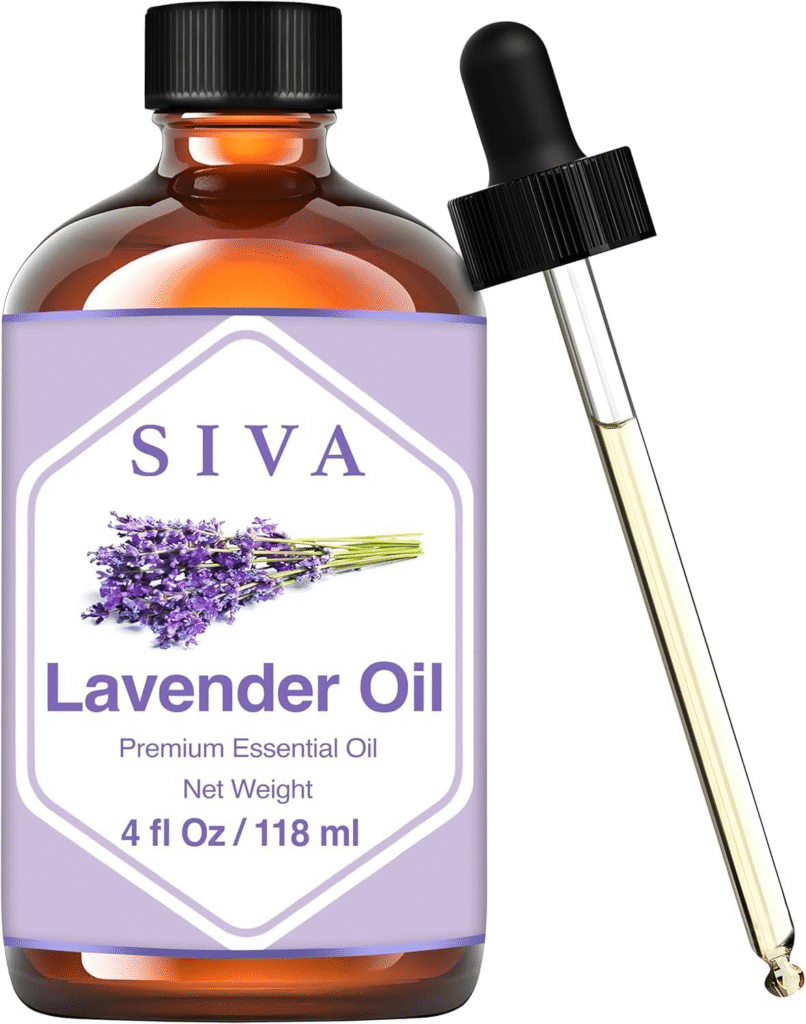
Anxiety Reduction
Numerous studies have demonstrated lavender’s anxiolytic (anti-anxiety) effects. A 2017 study published in the journal Frontiers in Behavioral Neuroscience found that inhaling lavender essential oil significantly reduced anxiety-like behavior in mice.
The researchers attributed this effect to lavender’s ability to modulate GABA receptors in the brain, which are involved in regulating anxiety.
For humans, a 2019 systematic review in the journal Phytomedicine analyzed 65 studies on lavender’s effects on anxiety and stress. The review provides evidence that lavender aromatherapy showed significant potential in reducing anxiety symptoms across various populations and settings.
Sleep Improvement
Lavender’s sleep-promoting properties are well-documented. A 2015 study in the Journal of Alternative and Complementary Medicine found that participants who inhaled lavender oil before bed reported better sleep quality and felt more refreshed upon waking compared to a control group.
The mechanism behind lavender’s sleep benefits may be related to its ability to increase slow-wave sleep, the deepest and most restorative phase of the sleep cycle. This was demonstrated in a 2005 study published in Chronobiology International, which used EEG measurements to show increased slow-wave sleep in participants exposed to lavender aroma.
Emotional Balance
Lavender’s ability to promote emotional balance stems from its dual action of calming overactive emotions while also gently uplifting mood. This makes it particularly useful for people experiencing mood swings or emotional instability.
A 2013 study in the International Journal of Psychiatry in Clinical Practice found that lavender oil capsules were effective in reducing symptoms of both anxiety and depression in patients with mixed anxiety-depressive disorder. While this study used oral administration, the results suggest lavender’s potential for addressing a range of emotional imbalances.
How to Use Lavender for Emotional Healing
- Diffusion: Add 5-7 drops of lavender essential oil to a diffuser and run it in your bedroom for 30 minutes before sleep or during meditation.
- Direct Inhalation: Place 1-2 drops of lavender oil on a tissue and inhale deeply for immediate calming effects during stressful situations.
- Topical Application: Mix 2-3 drops of lavender oil with a teaspoon of carrier oil (like jojoba or sweet almond) and apply to pulse points on wrists and temples.
- Bath Addition: Add 5-10 drops of lavender oil to a warm bath for a relaxing, stress-relieving soak.
- Pillow Spray: Create a simple pillow spray by adding 10 drops of lavender oil to 1 oz of distilled water in a spray bottle.
Mist lightly over pillows before bed.
2. Frankincense
Frankincense essential oil, derived from the resin of Boswellia trees, has been used for thousands of years in spiritual and healing practices. Its grounding and centering properties make it an excellent choice for emotional healing, particularly for reducing anxiety, improving focus, and promoting a sense of inner peace.
Recommended Product:
Handcraft Blends Frankincense Essential Oil – This oil is sourced from the best regions all over the world to bring you the best and finest. Perfect for aromatherapy, massage, skin care, and DIY soap making. Essential oil is a popular ingredient in homemade soaps, body oils, and scrubs.
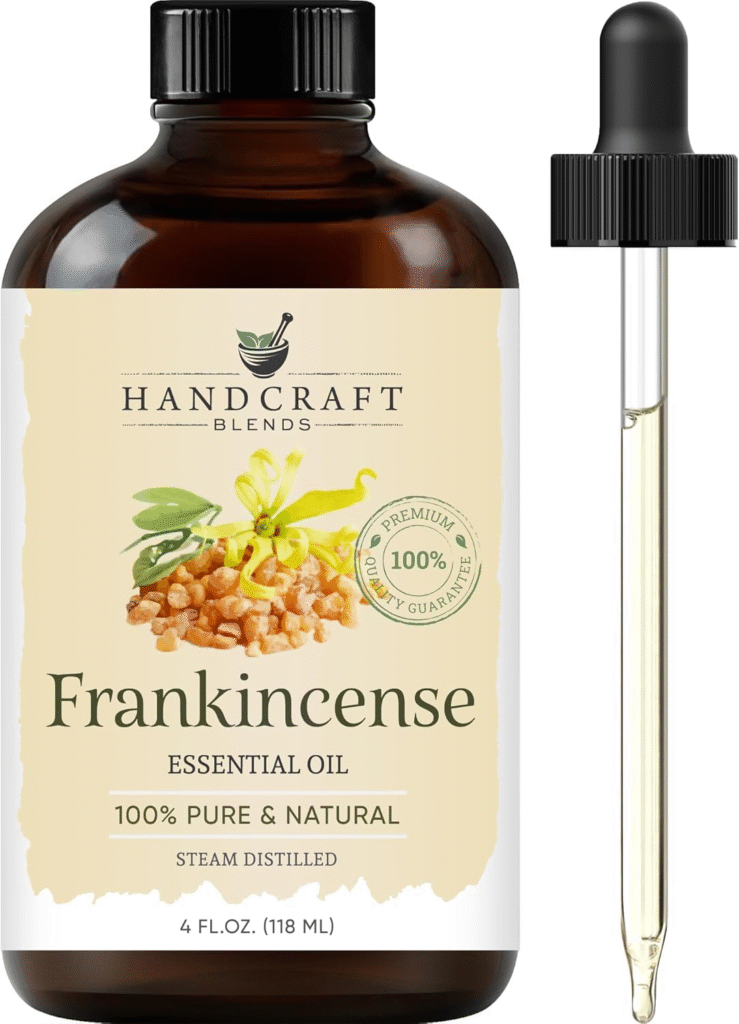
Anxiety Reduction
Frankincense has shown promising results in reducing anxiety symptoms. A 2019 study published in the Journal of Traditional and Complementary Medicine found that inhaling frankincense essential oil significantly reduced anxiety levels in patients undergoing coronary angiography.
The anxiolytic effects of frankincense may be attributed to its ability to modulate the activity of certain neurotransmitters in the brain. A 2008 study in the FASEB Journal discovered that a compound in frankincense called incensole acetate activates TRPV3 channels in the brain, which are involved in regulating emotions and reducing anxiety.
Improved Focus and Clarity
Frankincense has been traditionally used to enhance meditation and promote mental clarity. Modern research supports these uses, suggesting that frankincense can improve cognitive function and focus.
A 2016 study in the journal Frontiers in Aging Neuroscience found that frankincense extract improved spatial memory and learning in rats. While this study used oral administration, it suggests potential cognitive benefits that may extend to aromatherapy use.
Promoting Inner Peace
Frankincense’s ability to promote a sense of inner peace and emotional balance is one of its most valued properties. This effect may be related to its influence on the limbic system and its potential to modulate neurotransmitter activity.
A 2008 study in the journal Psychopharmacology found that incensole acetate, a compound in frankincense, had antidepressive effects in mice. The researchers suggested that this compound may be responsible for the sense of well-being and spiritual exaltation associated with burning frankincense in religious ceremonies.
How to Use Frankincense for Emotional Healing
- Meditation Aid: Diffuse frankincense oil during meditation or mindfulness practices to enhance focus and promote a sense of inner peace.
- Stress Relief: Apply a drop of diluted frankincense oil to the back of the neck or chest during times of stress or emotional turmoil.
- Emotional Processing: Use frankincense in a diffuser during journaling or therapy sessions to support emotional introspection and healing.
- Grounding Practice: Inhale frankincense directly from the bottle or from a few drops on a tissue when feeling overwhelmed or disconnected.
- Sleep Support: Add a few drops of frankincense to a bedside diffuser to promote relaxation and peaceful sleep.
3. Bergamot
Bergamot essential oil, derived from the rind of the bergamot orange, is unique among citrus oils for its ability to both uplift and calm simultaneously. This dual action makes it particularly effective for emotional healing, especially in cases of anxiety, depression, and stress-related disorders.
Recommended Product:
Cliganic Organic Bergamot Essential Oil – Cliganic essential oils are suitable for aromatherapy diffuser and have many other great uses and benefits. Free from additives, Cliganic aromatherapy oils are proudly non-gmo project verified, certified vegan and cruelty-free.
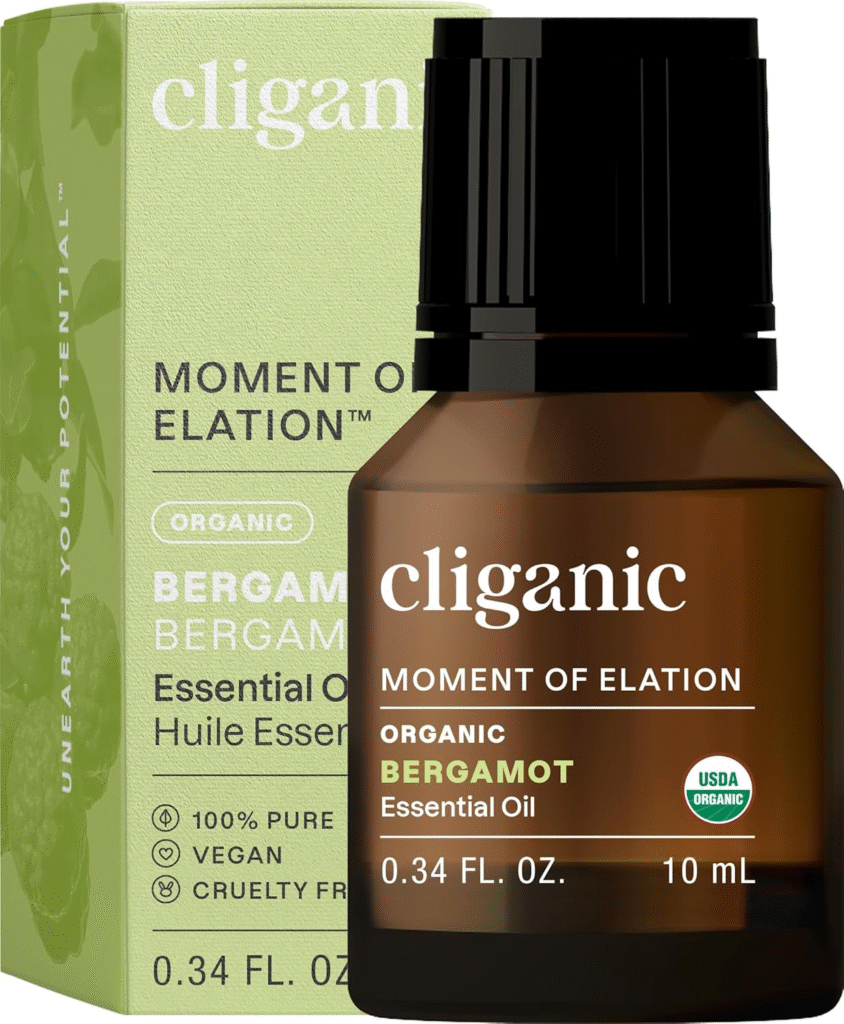
Anxiety and Stress Reduction
Bergamot has shown significant potential in reducing anxiety and stress levels. A 2015 study published in the journal Phytotherapy Research found that bergamot essential oil aromatherapy reduced anxiety, lowered heart rate, and decreased blood pressure in patients waiting for outpatient surgery.
The mechanism behind bergamot’s anxiolytic effects may be related to its impact on neurotransmitter systems. A 2011 study in the journal Molecules found that bergamot essential oil increased levels of gamma-aminobutyric acid (GABA) in rat hippocampus, suggesting a potential pathway for its anxiety-reducing effects.
Mood Enhancement
Bergamot’s ability to uplift mood makes it a valuable tool for addressing symptoms of depression and low mood. A 2017 study in the journal Complementary Therapies in Clinical Practice found that women who inhaled bergamot essential oil for 15 minutes showed significant improvements in positive feelings and energy levels compared to a control group.
The mood-enhancing effects of bergamot may be due to its influence on the release of neurotransmitters like dopamine and serotonin. A 2009 study in the Journal of Applied Sciences Research found that bergamot essential oil increased levels of these neurotransmitters in the brains of rats, suggesting a potential mechanism for its antidepressant-like effects.
Stress Hormone Reduction
Bergamot has been shown to reduce levels of cortisol, the primary stress hormone in the body. A 2015 study in the journal Physiology & Behavior found that participants who inhaled bergamot essential oil for 15 minutes had significantly lower salivary cortisol levels compared to those who inhaled a placebo.
This cortisol-lowering effect may contribute to bergamot’s overall stress-reducing and mood-enhancing properties, as high cortisol levels are associated with both stress and depression.
How to Use Bergamot for Emotional Healing
- Mood-Boosting Diffusion: Add 5-7 drops of bergamot essential oil to a diffuser during work hours or when feeling low to promote a positive mood.
- Stress-Relief Bath: Add 5-10 drops of bergamot oil to a warm bath for a relaxing and uplifting soak.
- Anxiety-Reducing Massage: Mix 2-3 drops of bergamot oil with a teaspoon of carrier oil and massage into temples or the back of the neck during anxious moments.
- Energy-Boosting Inhalation: Place a drop of bergamot oil on a tissue and inhale deeply for an instant mood and energy boost.
- Calming Room Spray: Create a room spray by adding 15-20 drops of bergamot oil to 2 oz of distilled water in a spray bottle.
Mist around your space to create a calming and uplifting atmosphere.
4. Ylang-Ylang
Ylang-ylang essential oil, derived from the flowers of the Cananga odorata tree, is known for its sweet, floral aroma and its powerful effects on emotional well-being. This oil is particularly valued for its ability to promote emotional openness, reduce negative emotions, and support cardiovascular health.
Recommended Product:
MAJESTIC PURE Ylang Ylang Essential Oil – All Majestic Pure Blends Essential Oils are tested by an independent lab to test the efficacy of each oil. Each oil is tested for its constituents as well as to have no fillers, additives and to be undiluted. This Essential Oil comes in an amber glass bottle to keep out UV rays and protect the oil against sunlight. It has a built-in dropper to control the flow and get the exact amount of oil without any waste.
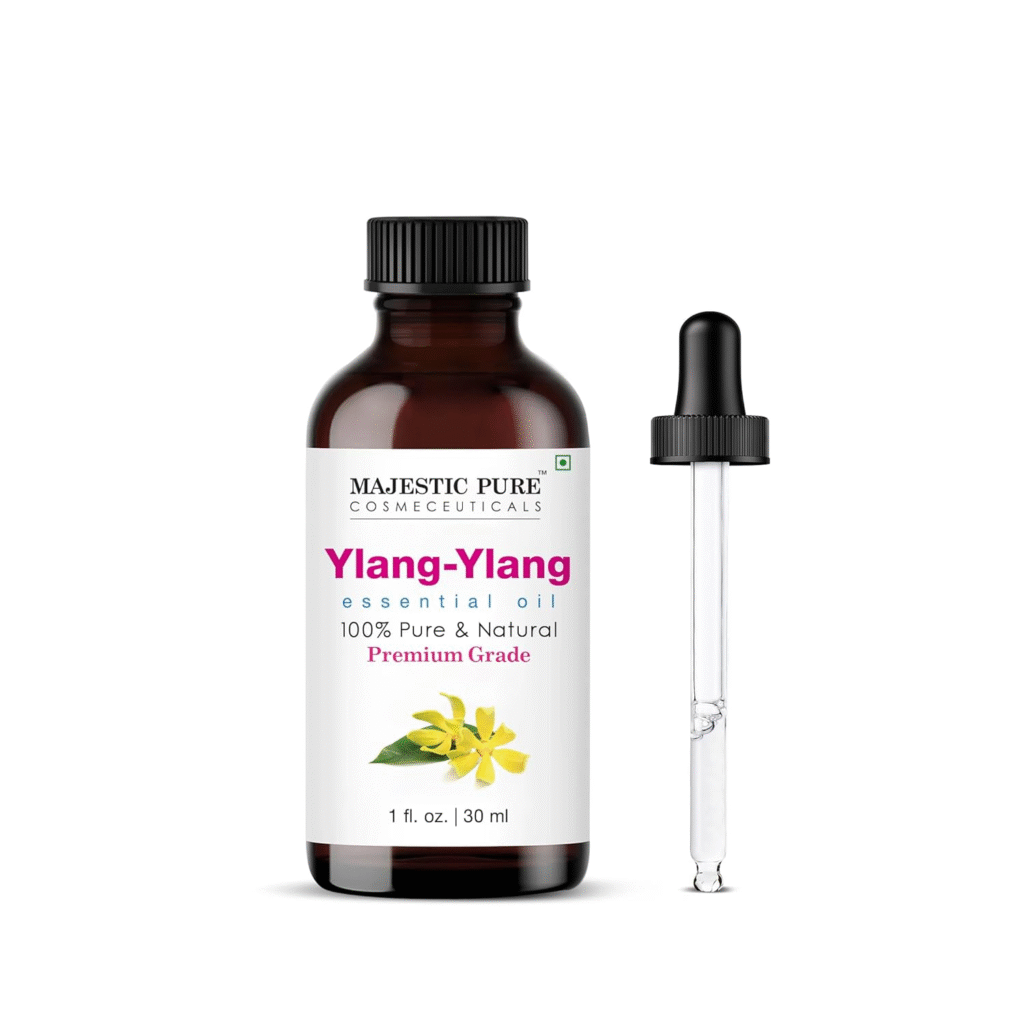
Emotional Balance
Ylang-ylang has a unique ability to balance emotions, helping to reduce negative feelings while promoting positive ones. A 2006 study published in the journal Phytotherapy Research found that inhaling ylang-ylang oil significantly decreased blood pressure and increased calmness and relaxation compared to a control group.
The emotional balancing effects of ylang-ylang may be related to its impact on the nervous system. A 2015 study in the Journal of Exercise Rehabilitation found that ylang-ylang aromatherapy reduced sympathetic nervous system activity (associated with stress) and increased parasympathetic activity (associated with relaxation).
Self-Esteem and Confidence
Ylang-ylang is often used to promote feelings of self-love and confidence. While scientific studies specifically on this aspect are limited, anecdotal evidence and traditional use support its effectiveness in this area.
The oil’s ability to reduce stress and promote relaxation may contribute to increased self-esteem by helping people feel more at ease with themselves and their surroundings.
Cardiovascular Benefits
Ylang-ylang’s effects on emotional health extend to physical benefits, particularly for the cardiovascular system. A 2013 study in the journal Evidence-Based Complementary and Alternative Medicine found that ylang-ylang essential oil reduced blood pressure and heart rate in healthy male volunteers.
These cardiovascular effects may contribute to ylang-ylang’s overall calming and stress-reducing properties, as high blood pressure and increased heart rate are often associated with stress and anxiety.
How to Use Ylang-Ylang for Emotional Healing
- Self-Love Ritual: Add 2-3 drops of ylang-ylang oil to a teaspoon of carrier oil and use for a nurturing self-massage, focusing on areas like the heart center or solar plexus.
- Confidence Boost: Diffuse ylang-ylang oil before important meetings or events to promote feelings of self-assurance and emotional openness.
- Stress Relief: Add a few drops of ylang-ylang to a warm bath to reduce stress and promote relaxation.
- Emotional Processing: Use ylang-ylang in a diffuser during journaling or therapy sessions to support emotional openness and healing.
- Sleep Support: Place a drop of ylang-ylang on your pillow or add to a bedside diffuser to promote restful sleep and positive dreams.
5. Chamomile
Chamomile essential oil, primarily derived from Roman chamomile (Chamaemelum nobile) or German chamomile (Matricaria recutita), is renowned for its gentle, soothing properties. This oil is particularly effective for emotional healing, especially for those dealing with stress, anxiety, and sleep disturbances.
Recommended Product:
Natural Way Chamomile Essential Oil – This oil is good for relaxation and rejuvenation. This chamomile essential oil organic is ideal for use in diffuser oils, creating a calming atmosphere for your home or workspace. Its versatility extends to being a great hair oil for hair growth, nourishing your scalp and promoting healthier, stronger hair. Our premium essential oil chamomile ensures purity and quality for an enhanced aromatherapy experience.
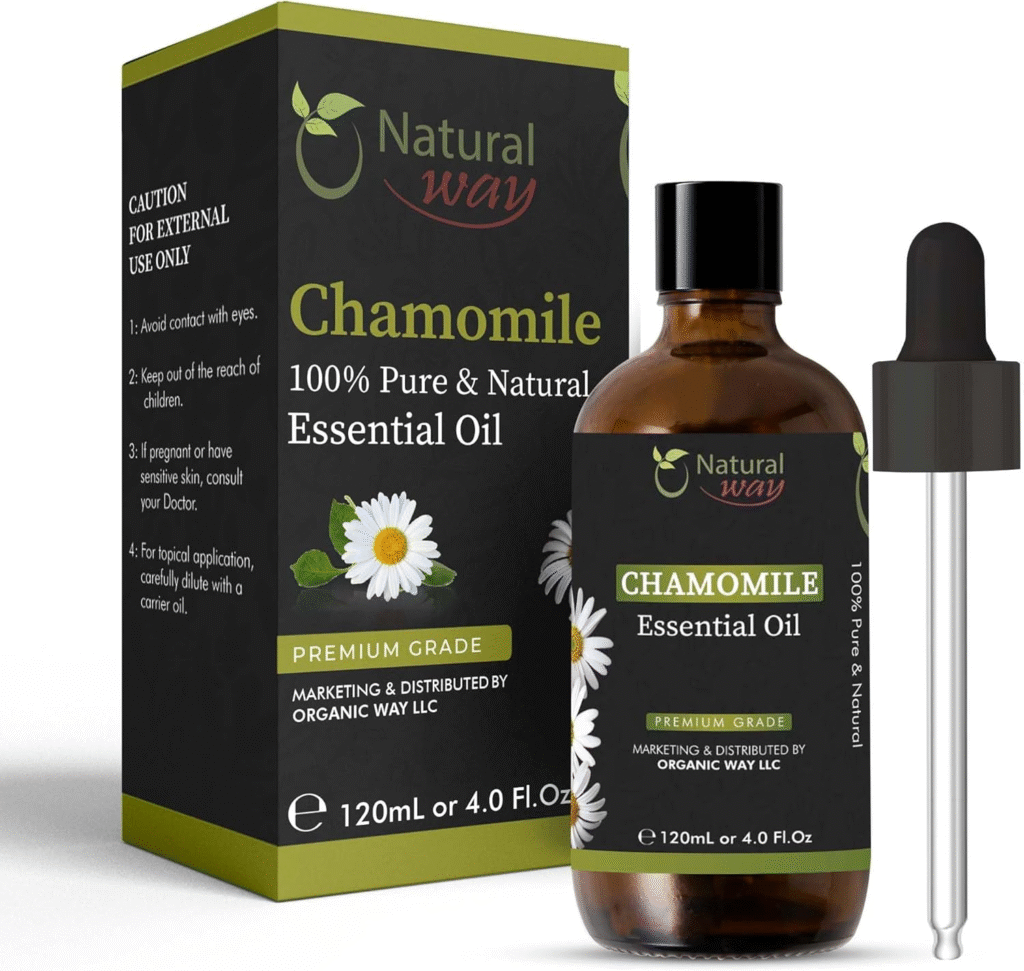
Anxiety Reduction
Chamomile has long been used as a natural remedy for anxiety, and scientific research supports this traditional use. A 2009 study published in the Journal of Clinical Psychopharmacology found that chamomile extract significantly reduced anxiety symptoms in patients with generalized anxiety disorder.
While this study used oral chamomile extract, the aromatic compounds responsible for these effects are also present in the essential oil. A 2013 study in the journal Evidence-Based Complementary and Alternative Medicine found that inhaling chamomile essential oil reduced anxiety and improved sleep quality in intensive care unit patients.
Sleep Improvement
Chamomile’s sleep-promoting properties are well-documented. A 2017 study in the journal Complementary Therapies in Medicine found that elderly people who received chamomile extract experienced significantly improved sleep quality compared to a control group.
The sleep benefits of chamomile may be related to its effects on GABA receptors in the brain. A 2011 study in the European Journal of Pharmacology found that chamomile extract exhibited benzodiazepine-like hypnotic activity, suggesting a potential mechanism for its sleep-promoting effects.
Stress Reduction
Chamomile essential oil has shown potential in reducing stress and its physical manifestations. A 2018 study in the Journal of Evidence-Based Integrative Medicine found that chamomile tea (which contains similar compounds to the essential oil) significantly reduced cortisol levels and improved sleep quality in postpartum women.
The stress-reducing effects of chamomile may be due to its ability to modulate the hypothalamic-pituitary-adrenal (HPA) axis, which is involved in the body’s stress response. A 2012 study in the journal Molecular Medicine Reports found that chamomile extract reduced HPA axis activity in stressed rats.
How to Use Chamomile for Emotional Healing
Emotional Processing: Use chamomile in a diffuser during meditation or journaling to support emotional healing and stress reduction.
Calming Diffusion: Add 5-7 drops of chamomile essential oil to a diffuser during times of stress or before bed to promote relaxation.
Soothing Bath: Add 5-10 drops of chamomile oil to a warm bath for a calming and stress-relieving soak.
Sleep Support: Place a drop of chamomile oil on your pillow or add to a bedside diffuser to promote restful sleep.
Anxiety Relief: Mix 2-3 drops of chamomile oil with a teaspoon of carrier oil and apply to pulse points during anxious moments.
Blending for Synergy
While each of these essential oils offers powerful benefits on its own, blending them can create synergistic effects that enhance their emotional healing properties. Here are some effective blend recipes to try:
1. Calming Blend
- 3 drops Lavender
- 2 drops Frankincense
- 1 drop Chamomile
This blend combines the relaxing properties of lavender, the grounding effects of frankincense, and the gentle soothing of chamomile. Use this blend in a diffuser before bed or during times of stress to promote deep relaxation and emotional balance.
2. Uplifting Blend
- 3 drops Bergamot
- 2 drops Ylang-Ylang
- 1 drop Lavender
This blend harnesses the mood-boosting power of bergamot, the emotional opening effects of ylang-ylang, and a touch of lavender for balance. Diffuse this blend during the day to promote positivity and emotional resilience.
3. Grounding Blend
- 3 drops Frankincense
- 2 drops Lavender
- 1 drop Bergamot
This blend combines the centering properties of frankincense with the calming effects of lavender and a hint of bergamot for uplift. Use this blend during meditation or times of emotional turmoil to promote a sense of inner peace and stability.
4. Stress-Relief Blend
- 2 drops Lavender
- 2 drops Bergamot
- 1 drop Ylang-Ylang
- 1 drop Chamomile
This comprehensive blend addresses many aspects of stress relief, combining the relaxing effects of lavender and chamomile with the mood-enhancing properties of bergamot and the emotional balancing of ylang-ylang. Diffuse this blend during high-stress periods or use in a personal inhaler for on-the-go stress relief.
5. Sleep Support Blend
- 3 drops Lavender
- 2 drops Chamomile
- 1 drop Frankincense
This blend combines the sleep-promoting properties of lavender and chamomile with the grounding effects of frankincense. Use this blend in a bedside diffuser or add to a spray bottle with water to mist over pillows and bedding for improved sleep quality.
When creating and using these blends, always remember to:
- Use high-quality, pure essential oils from reputable sources.
- Dilute properly before applying to skin (typically 2-3 drops of essential oil blend per teaspoon of carrier oil).
- Perform a patch test before using a new blend topically to check for any adverse reactions.
- Adjust the ratios as needed based on personal preference and sensitivity.
- Be mindful of any person contraindications or sensitivities to specific oils.
Safety Considerations
While essential oils are natural products, they are also highly concentrated and potent. It’s important to use them safely and responsibly.
Here are some key safety considerations:
- Dilution: Always dilute essential oils properly before applying to the skin. A general guideline is 2-3 drops of essential oil per teaspoon of carrier oil.
- Skin Sensitivity: Perform a patch test before using a new oil or blend topically.
Apply a small amount of diluted oil to the inside of your wrist and wait 24 hours to check for any adverse reactions.
- Photosensitivity: Some oils, particularly citrus oils like bergamot, can increase skin sensitivity to sunlight.
Avoid sun exposure for at least 12 hours after applying these oils topically.
- Pregnancy and Breastfeeding: Consult with a qualified aromatherapist or healthcare provider before using essential oils if you are pregnant or breastfeeding.
- Medical Conditions: If you have any medical conditions or are taking medications, ask with your healthcare provider before using essential oils, as they can interact with certain medications.
- Children and Pets: Use extra caution when using essential oils around children and pets.
Many oils that are safe for adults can be harmful to children and animals.
- Ingestion: Do not ingest essential oils unless under the guidance of a qualified aromatherapist or healthcare provider.
- Quality: Use only high-quality, pure essential oils from reputable sources.
Avoid synthetic fragrances or oils that have been adulterated.
- Storage: Store essential oils in dark glass bottles in a cool, dark place to preserve their potency and prevent degradation.
- Overuse: More is not always better with essential oils.
Stick to recommended usage guidelines and give your body breaks from oil use to prevent sensitization.
People Also Asked
What is the best essential oil for anxiety?
Lavender is often considered the best essential oil for anxiety due to its well-documented calming effects. However, bergamot and chamomile are also highly effective for reducing anxiety symptoms.
Can essential oils help with depression?
Some essential oils, particularly bergamot and ylang-ylang, have shown potential in improving mood and reducing symptoms of depression. However, essential oils should not be used as a substitute for professional mental health treatment.
How long does it take for essential oils to work for emotional healing?
The effects of essential oils can be immediate when inhaled, but for long-term emotional healing, consistent use over several weeks or months may be necessary to see significant changes.
Are essential oils safe for children to use for emotional support?
Some essential oils can be safe for children when used properly, but it’s crucial to ask with a qualified aromatherapist or healthcare provider before using essential oils with children.
Can I mix different essential oils for emotional healing?
Yes, blending essential oils can create synergistic effects that enhance their emotional healing properties. However, it’s important to understand the properties of each oil and blend them safely.
How often should I use essential oils for emotional healing?
This can vary depending on the person and the oils being used. Generally, using essential oils 1-3 times daily is common, but it’s important not to overuse them.
Can essential oils interact with medications?
Some essential oils can interact with certain medications. If you’re taking any medications, it’s important to ask with your healthcare provider before using essential oils.
Is it safe to use essential oils during pregnancy?
Some essential oils are considered safe during pregnancy, while others should be avoided. Always ask with a qualified healthcare provider before using essential oils during pregnancy.
Can essential oils cure emotional trauma?
While essential oils can support emotional healing, they cannot “cure” emotional trauma. Professional mental health support is crucial for addressing deep-seated emotional issues.
How do I know if an essential oil is pure and high-quality?
Look for oils that are 100% pure, with no additives or synthetic fragrances. Reputable companies will provide detailed information about their sourcing and testing processes.
Key Takeaways
- Lavender essential oil is versatile and effective for reducing anxiety and improving sleep quality.
- Frankincense oil promotes grounding and mental clarity, making it valuable for emotional healing.
- Bergamot oil uniquely combines uplifting and calming properties, helping to reduce stress and improve mood.
- Ylang-ylang oil supports emotional openness and self-love, while also offering cardiovascular benefits.
- Chamomile oil provides gentle, soothing effects that are particularly helpful for stress relief and sleep improvement.
Disclaimer
The information contained in this post is for general information purposes only. The information is provided by Top 5 Essential Oils for Emotional Healing and while we endeavor to keep the information up to date and correct, we make no representations or warranties of any kind, express or implied, about the completeness, accuracy, reliability, suitability or availability with respect to the website or the information, products, services, or related graphics contained on the post for any purpose.

